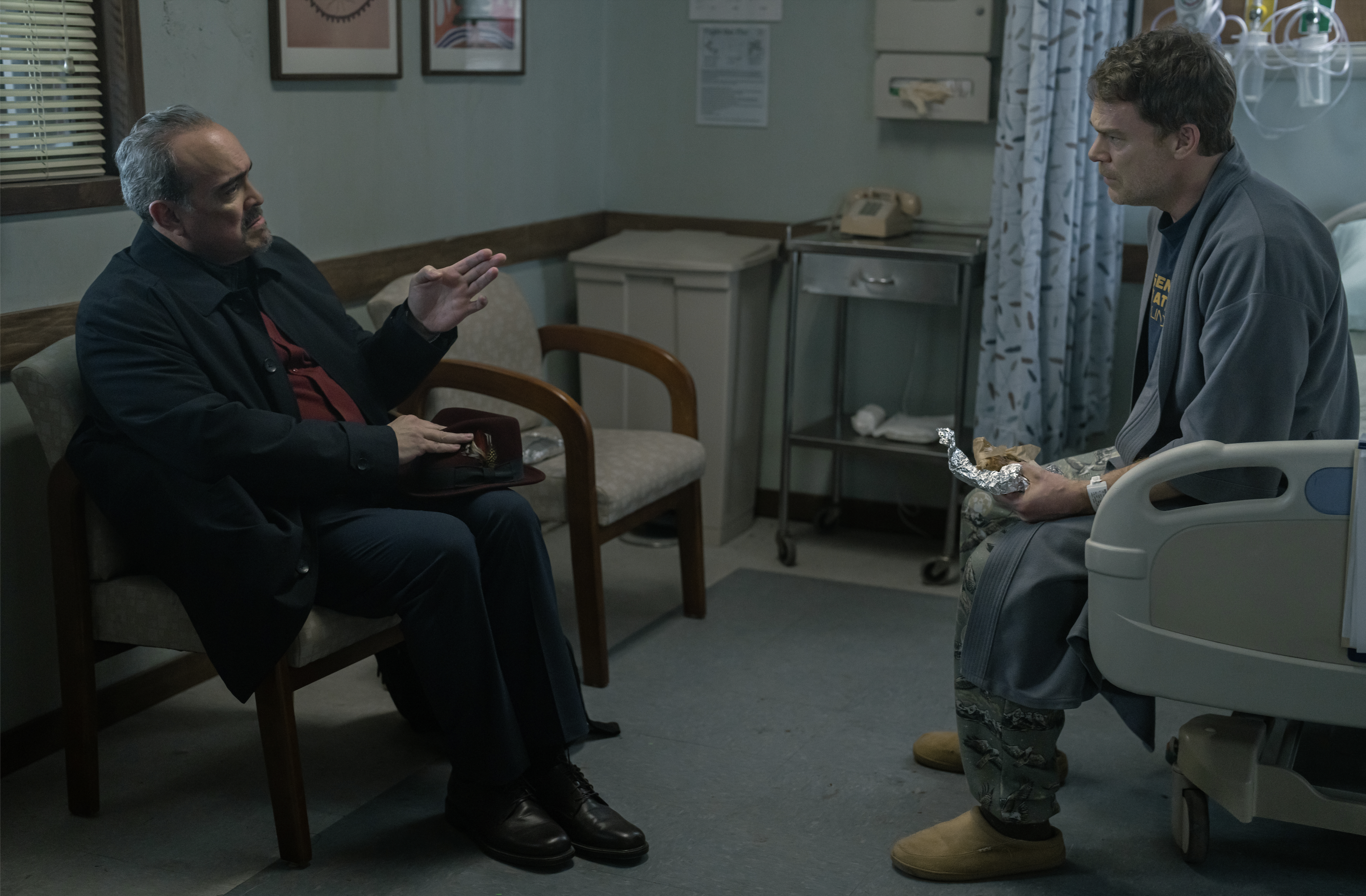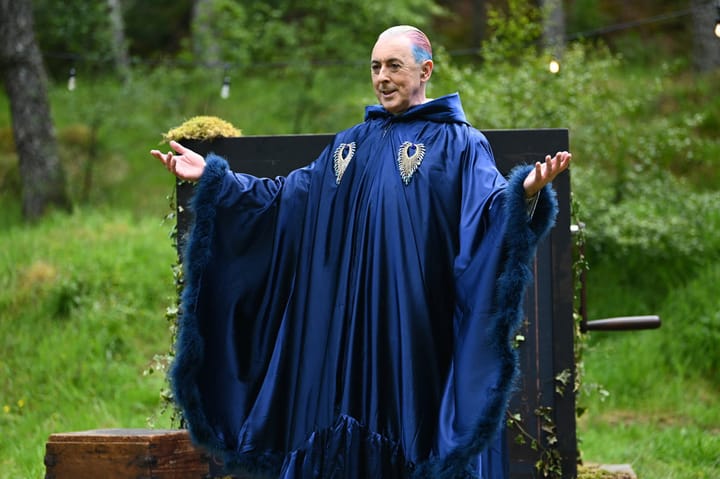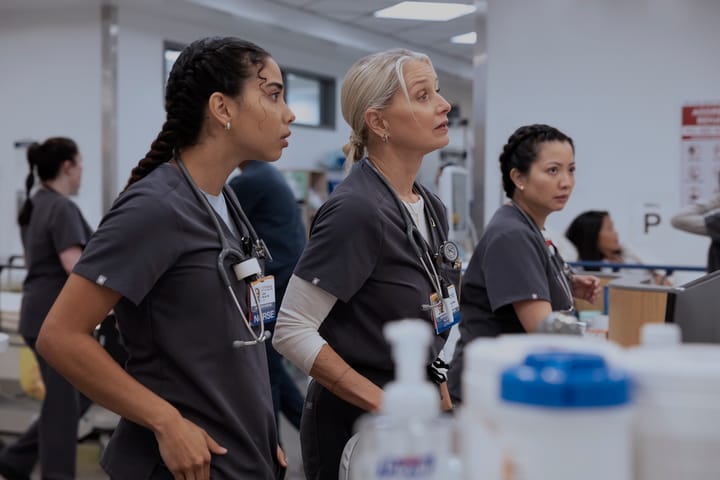Review: Dexter: Resurrection, "A Beating Heart" & "Camera Shy" | Season 1, Episodes 1 & 2
Guess who's back? Back again.

Welcome to Episodic Medium’s coverage of Showtime’s latest effort to make the Dexter franchise happen, Dexter: Resurrection. As always, this first review—which covers the first two episodes—will be free for all, but subsequent reviews will be exclusively for paid subscribers. To see what else we’re covering in the month ahead, check out our full summer schedule.
Author’s Note: If you’ve only seen the first episode, don’t worry, I’ll tell you where to stop reading if you don’t want any spoilers. [Editor’s Note: I’m struggling to imagine someone stopping after the first episode given how little of the premise is actually revealed, so honestly? Go watch the second episode first.]
You would think, by now, that everyone in Hollywood knows there are certain things you don’t say, at least not if you like money more than you like definitive storytelling. But somehow Clyde Phillips, the creative architect and showrunner behind Dexter: Resurrection, Dexter: Original Sin, Dexter: New Blood, and what most would consider the best seasons of the original Dexter (1-4), didn’t get the memo. Check out his words to Deadline back in 2021, after he ended the New Blood limited series with Dexter Morgan lying dead on the ground, shot in the chest by his now-grown son, Harrison:
I have three words for you: Dexter is dead. I wouldn’t do that to the audience. It would be dishonest. Here, there is no question that this is the finale of Dexter. Dexter is dead.
Whoops.1
Well, if you’re going to sacrifice ostensible artistic credibility on the altar of capitalism and franchise IP, you’d better make sure it’s at least going to be a good time for both you and the audience.2 And while there are plenty of Michael C. Hall interviews that tell you how much fun he still has playing this character, the real question is whether or not a show that ended its initial run feeling like it was wheezing along on the fumes of fumes can recapture any of that old magic. I’m happy to report that, unlike the largely forgettable origin story of Original Sin, Dexter is back, and based on these first two episodes he’s ready to be fun to watch again.
This is pretty much all thanks to Hall himself. It’s easy to forget that the original Dexter was, as I’ve previously said, “a show with an A-plus star surrounded by a B-team.” In other words, it all rests on Hall’s capable shoulders, with the uneven supporting cast only there to facilitate as many scenes as possible with the star. He’s played Dexter for so long at this point (20 years!) that slipping back into character probably comes as naturally as saying, “dark passenger.” [Foreshadowing alert.] And with the exception of some throat-clearing and table-setting to kick things off, once Dexter is back up and on the move the show eases into an enjoyably brisk and pulpy return to simple pleasures: murder, and the plotting thereof.
A quick reassurance for any lapsed fans or curious folks worried about having to do any homework before starting up Resurrection: You don’t need to watch a single frame of New Blood to understand what’s going on here. (And definitely no need to watch Original Sin, although that’s just good advice.)3 This reboot kicks off with the requisite summary of what happened to Dexter in that limited series, up to and including his supposed death at the hands of his son, Harrison. A few labored scenes of exposition wave away the fact that Dexter was previously accused of murder, giving him a get-out-of-jail-free card for his past actions and setting the narrative table for this new story. It’s important information only insofar as it informs Hall’s evolution of the character, and the fact that—for the time being at least—the father-son dynamic forms the emotional core of the character.
Oh, and also because Dexter’s ex-girlfriend from his previous life as “Jim Lindsay” called Dex’s old buddy, Angel Batista, and told him that Dexter was not only alive and well and living under a new name, but was also the Bay Harbor Butcher. That, too. Naturally, once Dexter gets out of his coma, Batista comes calling, under the guise of friendship but pretty clearly ready to nail Dexter to the wall if he can find any evidence to support the accusation. He even fixes Dexter’s death certificate, giving him his old name and life back. (Because, as Dexter notes, you can’t try someone for murder if they’re legally dead.) So yeah, that’s gonna be a problem.

But “A Beating Heart” first wants to offer a reset of sorts to its antihero. By the end of New Blood, Dexter had strayed pretty far from Harry’s Code—the moral compass that had guided his actions and provided justification for his bloodlust by confining it to other murderers—and so the new series spends some time in his head. The goal seems to be getting him to a place of, if not absolution, then at least a chance at redemption. Kicking things off in his hospital bed lying in a coma, we get a series of visions featuring those who most challenged Dexter’s double life as both family man and killer, or at least the ones who could be coaxed back for a cameo appearance in this series premiere. The Trinity Killer Arthur Mitchell (John Lithgow), Miguel Prado (Jimmy Smits), and even good old ridiculous Sergeant James Doakes (Erik King) pop up to talk Dexter through what he understandably feels was his much-deserved death. These visions are his subconscious working through the entirely justifiable guilt over all the deaths that accrued because Dexter wanted to “have it all,” as Arthur tells him: by trying to maintain relationships, friendships, and family bonds while still pursuing his homicidal impulses, he doomed good people to death, collateral damage in his pursuit of eye-for-an-eye justice.
But as he is reminded by these specters (and eventually his OG haunting: dad Harry, played again by James Remar), past failures are no excuse for future inaction when it comes to making amends. So after a little physical therapy and a threatening visit from Batista (smiling as he all but tells Dexter “I’m gunning for you, buddy”), our protagonist is presented with an offer he can’t refuse: Harrison is in trouble. This new series divides our time between Dexter and his son, the latter now living in NYC and working as a concierge at an upscale hotel. Naturally, his efforts to stay out of trouble and reject his heritage almost immediately run aground when he interrupts a sexual assault and ends up killing the guy after they essentially confess to being a serial rapist. Despite doing his best to remember the lessons imparted by his father on How To Get Away With Murder, the body is eventually found—or rather, the body parts, all nine of them, which is how Dexter realizes this mysterious new killer in the city is probably his son.
So after some hand-wringing, Dexter makes a break for it (so to speak—as the sheriff reminds Batista, it’s not illegal to check yourself out of the hospital) and heads to the Big Apple). It’s a fleet, efficient opening episode, albeit occasionally suffering under the weight of trying to resolve all the formerly closed loose ends that got reopened by walking back Dexter’s death. It also makes for nice, straightforward plotting: Dexter is going to try and help the son who presumably wants nothing to do with him—who, in fact, believes him to be dead.
But of course it won’t be that simple, because out of nowhere in the last five minutes, we cut to a scene featuring a black-clad criminal operative, who breaks into the home of some heretofore-unknown serial killer, leaves them a suitcase and a message, then leaves, while making a call consisting of one sentence: “Invitation delivered.” And in a fun bit of unexpected casting, this mystery operative is played by Uma Thurman. Who is she? What does she want? Why is she leaving cash for a serial killer? Tune in next week!
Or rather, just keep watching, because the first two episodes have premiered back-to-back.

“Camera Shy” wastes no time in complicating things by introducing a new target for Dexter’s Dark Passenger, and, in an entertaining twist, it’s a killer the media has dubbed the “Dark Passenger.” We see the guy hop into a rideshare car, start up a conversation with the Haitian immigrant driver, and then proceed to threaten his life in a very unsettling manner. Cut to the next morning, when someone finds that driver with his head severed from his body. It’s a clever way to pull Dexter out of his single-minded desire to help Harrison, literally confronting him with a sentient embodiment of his bloodthirsty impulse. Now, there are two reasons for Dexter to stay in NYC: aid his son, and start taking out killers again. As he says to ghost Harry: “It’s called multitasking.”
Of course, whether or not Harrison would even want his help is still very much up in the air. Dexter’s son isn’t exactly a chip off the old block—he may have learned how to do it, but being a killer is messing with Harrison’s head, and he was already a little messed up from shooting his own father. He’s having visions of the man he killed, haunting him even during daytime. Given that we already saw Harrison have a waking vision during work of the icy setting where he took out dad, this new nightmare popping up is driving him to drinking, drugs, and anything else to try and drown it out. Hell, even the truck he inherited (complete with Dexter’s final letter to him in the glove compartment) is an unwelcome reminder of his bloodline, emphasis on “blood”—and soon enough, he’s selling it to his friend. None of that bodes well for a family reunion.
Luckily, the show doesn’t spend too much time with morose Harrison, because he’s a bit of a bummer, and things slow down whenever we turn away from Dexter to follow around his progeny. Unfortunately, the other non-Dexter pair we spend time with is also a clunkier element. Detectives Claudette Wallace and Melvin Oliva are the ones assigned to the case of the chopped-up body, and while I’m more or less fine with the actors, for some reason the show couldn’t just make them decent detectives. No, Detective Wallace has to be one of those special only-in-screenplays detectives who have a preternatural ability to sniff out clues through unconventional methods. In the premiere, it was by putting on headphones and listening to “Stayin’ Alive” while magically locating all the body parts among hundreds of bags at the dump. Why? Why not just show them doing good police work? The idea that the cop on Harrison’s tail needs to be some oddball super-genius feels a bit hoary. Thankfully, we don’t get much of it, and thereafter her skills are limited to more reasonable achievements, like figuring out the murder weapon in the hotel bathroom and realizing it’s also the scene of the crime.
But mostly, this is a fun installment that showcases Dexter In The Big City™. The best of it is watching Hall turn Dexter into a slightly hobbled gumshoe of his own, trying to put together how Harrison pulled it off and stepping in to try and catch whatever clues his son left behind before the police can. Turns out, abandoning his physical therapy might not have been the best move for his health—the show gets some mileage out of the disjunction between what Dexter would like to accomplish and what he’s incapable of, thanks to his limited mobility. It’s even more fun when the back half of the episode leans into his hunt for the Dark Passenger, tracking down the guy and eventually coming face to face with him. It’s fast-paced, fun, and feels like the Dexter of old, in a good way.
Does the discovery of “Ronald Schmidt”, who works for Bridge Data Network Security, go by a little too fast and coincidentally? Of course. Does Dexter’s tracking him down and immediately marking him as the killer happen in roughly two minutes? Sure. But again, an audience can forgive a lot in the name of artfully crafted entertainment, and this is done well. There’s a fine line between good Dexter and bad—its not like the one-off killers he hunted in season seven, for example, were all that markedly different than past years—but it’s all in the execution (no pun intended), and this is an excellently crafted hour of television. (Episode editor Kate Ennis deserves special recognition here.) After all this time, and a dour (if albeit fitfully satisfying New Blood) belated series wrap-up, is Dexter….fun again?!
Hell, even the world-building isn’t as clunky as it could have been. During his own Uber ride (sorry, “UrCar”), Dexter meets Blessing, a driver who not only befriends our awkward protagonist, but invites him to a party, where Dexter meets the one driver who survived his encounter with the Dark Passenger killer, and learns about the existence of infrared camera identity prevention. More importantly, he gets a new place to stay, in an apartment right below Blessing and his family, now that he’s committed to staying in New York and helping Harrison. Blessing is a fairly one-note character, but his open-hearted goodness makes for a smart and sometimes funny counterpoint to Dexter’s machinations, never a bad thing. (It’s a role that the previous series supporting cast used to pass around like a case-of-the-week virus.) After these two episodes, we’ve got a new home base, new missions, and everything feels ready to roll for an entertaining return.
But then, there’s this new wrinkle that continues to develop. Uma Thurman’s mysterious baddie (named Charley) pops up again this week, and she’s in Michigan to deliver a message to someone we can only assume is another serial killer. “You are out. Never contact us again,” she tells him, and while the full story is still ambiguous, here’s what’s discernible: This guy is a killer nicknamed the “Canton Clubber,” and he's asked for money from her boss. This is a big no-no, so he’s lost his income and whatever nefarious work they asked him to perform. When he tries to plead his case, she uses his own nail-embedded baseball bat against him. This is a big swing, and I have no idea yet if it’s going to pay off or just result in a muddled, overstuffed mess. It’s certainly ambitious, which I admire, especially after the nothingburger stakes of both New Blood and Original Sin (especially the latter).
Plus, it provides a real opportunity for Dexter Morgan to try and showcase what the writers are very clearly hoping is a noticeable evolution in the character’s moral journey. When the Dark Passenger attempts to duck into someone’s UrCar and commit his next murder, Dexter saves the day, pretending it’s his car and interrupting the guy from executing another innocent driver—something old Dexter would likely have let unfold just to confirm he’s really got his guy. It’s not a perfect beat—it’s silly to pretend old Dexter never saved anyone from getting murdered—but the show wants to set it up as such, and in the context of the narrative, it works. “Since when do you care about other people?” Harry asks. “Since now,” Dexter responds. As long as it’s couched in such crackerjack entertainment, we’ll let the retconning slide.
Stray observations
- Since when is Dexter such a fount of needle drops? They’re all over the place in these first two episodes: In “A Beating Heart” we get Parquet Courts’ “Master Of My Craft” scoring Harrison’s rise-and-shine routine, The Strokes’ “Bad Decisions” to his body-evisceration sequence, Ramones’ “Blitzkrieg Bop” for the NYC arrival…even the latest use of Nick Cave’s “Red Right Hand.” (Time for a moratorium on that one yet, TV shows?) And “Camera Shy” literally kicks off with Black Sabbath’s ‘War Pigs,” before giving us Justin Townes Earle’s “The Saint Of Lost Causes” (not a good sign for Harrison?), and more. As someone who is quick to point out a lazy needle drop, I’m skeptical; as a critic appreciating a reboot’s effort to freshen things up, I approve.
- As ever, Dexter isn’t shy about leaning into a goofy smash-cut joke. In this case, it’s the sheriff telling Batista, “Wherever he is, he must be miserable.” Cut to Dexter in the hotel restaurant: “Can I get some more of those sour pickles?”
- Did I laugh a lot when Doakes pulled back the hospital curtain with a “Surprise, motherfucker!” I absolutely did.
- I haven’t discussed Harrison’s work friend, Elsa Rivera (Emilia Suarez), yet, mostly because they have given her nothing to do other than be a potential love interest with a kid, a situation familiar to Dexter fans. If they start to expand it beyond literally the three short scenes in these first episodes, it could be interesting, but so far she’s a narrative placeholder.
- I actually found the reunion scene with Batista to be incredibly well-written. Is he suspicious as hell of Dexter, and ready to pounce? Of course. But he’s also an old friend who feels personally invested, and understands everything his pal says about wanting to disappear: “Grief…does something to you.”
- I’m guessing by now you’ve all seen Peter Dinklage’s name in the credits, even though he hasn’t appeared onscreen yet. Even if you didn’t read anything about this show, it’s not hard to predict that he’s Uma Thurman’s unseen boss, who is somehow employing a serial killer or two in ways we have yet to learn about. I still worry this plot development is going to be the show biting off more than it can chew, but either way, who isn’t excited to see Peter Dinklage?
- Welcome, everyone, to the reviews of Dexter: Resurrection. After the mess that was Original Sin, it’s exciting to have a chance to evaluate what they do with the man himself, rather than a weird young cosplay version of Michael C. Hall’s indelible creation. (No offense to Patrick Gibson, who I honestly think did a great job as the early version of our serial killer.) Looking forward to hearing your thoughts as we get into this—and these were fun episodes, weren’t they?
It reminds me a bit of a quote Jensen Ackles gave midway through season five of Supernatural, back when everyone assumed the planned five-season arc was all they would ever do of that show, when asked if he would ever consider continuing the series: “No. I mean, they’d have to back up the Brinks truck.” I guess they did. ↩
In Phillips’ defense, apparently this was Michael C. Hall’s idea, as was recruiting his old showrunner back into the fold for it. ↩
Myles here—I hadn’t seen any of New Blood and found the recap Showtime provided perfectly acceptable to dive into this. ↩




Comments ()